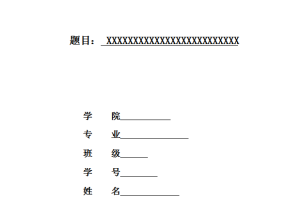Abstract
Personal names refer to the symbols indicating each particular member in the society. As an essential part of human language, personal names are playing a very dominant role in the communication. China and English-speaking countries have shaped different naming systems, which involve almost every aspect of human society, such as history, geography, economy, politics, etc. At the same time, as carriers of cultures, Chinese and English names are full of cultural connotations, and result in cultural gap between Chinese and English. Personal names are not only symbols that distinguish one person from others, but also social symbols. It is “a mirror of culture”. Through comparative study from the sources of Chinese and English names to family concepts, values, religious beliefs, bynames, different cultural connotations between Chinese and English names are clearly revealed. In Chinese names, the culture of Confucian-worship, hierarchy can be found, so can the religion, personal-orientation, individualism be found in English names. By comparison and through analysis, it can be concluded that name is a sign as well as an information window, through which people may better perceive a society and its culture in various aspects, and that the development of personal name system synchronizes with the improvement of society and the development of culture. That is to say, the development of names can show the changing of society in different times, and the development of culture in turn influences the process of naming and leaves its marks on names. So names are windows to see through different cultures. And it is the variety of culture that leads to the differences in Chinese and English personal name systems. A probe into this linguistic phenomenon of names helps people to broaden the knowledge on Chinese and English names and to enhance mutual understanding and communication between eastern and western culture.
Key Words: Chinese and English names cultural connotation
cultural differences
摘 要
姓名是指人类社会中每一个具体成员的正式的代指符号。作为语言的重要组成部分,姓名在人们的交往过程中有着举足轻重的作用和地位。汉英国家在其发展过程中形成了不同的姓名系统,主要涉及到历史,地理,经济,政治等领域。同时,姓名作为一种文化载体,蕴涵着极其丰富的文化内涵,汉英姓名因而存在着巨大的文化差异。也就是说,姓名不仅仅是一种简单的区别于他人的符号,它同时也代表一种社会文化现象,被喻为“文化的镜像”。本文通过对汉英姓名的来源阐释, 进而从家庭观念,价值观念,宗教信仰,别名现象等的对比研究,揭示出汉英姓名的深层文化内涵。汉英文化内涵的差异,如中国的崇儒思想,等级制度等文化因素都可以从中国人的姓名中反映出来。而英语民族的宗教信仰,个人取向,强调个性也在英语姓名中有所反映。通过比较和分析表明,姓名不仅仅是人们籍以相互区别的标志或符号,还是交往的开端,更是人们了解一个社会及其文化诸多方面的一个信息窗口。也表明了姓名系统的演变同社会的进步、文化的发展是同步的。也就是,姓名的发展变化可以反映出一个社会的时代变化,而历史文化的发展变化也影响人们的命名过程,从而在姓名中留下其印记,所以说姓名是透视文化的窗口。而正是文化的多样性,导致英汉姓名的差异。探究姓名这一语言现象,加深人们对于汉英姓名文化的了解, 并促进东西方文化交流和增进相互了解。
关键词: 汉英姓名 文化内涵 文化差异
Contents
Acknowledgements……………………………………………………..……………i
Abstract (English)………………………………………………..………..…………ii
Abstract (Chinese)……………………………………………………..…………… iv
- Introduction……………………………………………………………………….1
- Surname sources …………………………………………………..….………….1
2.1 Chinese surname ……………………….………………………………….….1
2.1.1 Evolution of Chinese surname……………….………………………….1
2.1.2 Chinese surname sources……………….………………………………2
2.2 English surname ………………………………………………………………5
2.2.1 Evolution of English surname……………………………………………6
2.2.2 English surname sources…………………………………………………7
- Given name sources ……………………………………………. …………………9
3.1 Sources of Chinese given name ………………………………….…………….9
3.2 Sources of English given name………………………………….………….…10
- Cultural differences between Chinese and English names….………….……………11
4.1 Family contents………………..………………………….……………………12
4.1.1 Importance attached to Chinese surnames rather than given names…….12
4.1.2 Importance attached to English given names rather than surnames………13
4.2 Avoidance of taboo…………………………………………………………….13
4.2.1 Avoidance of taboo in China ……………………………………………14
4.2.2 People-oriented in naming……………………………………………….14
4.3 Religion………………………………………………………………………..15
4.3.1 Chinese names influenced by Confucianism…………………………….15
4.3.2 English names influenced by Christianity……………………………….16
4.4 Byname phenomenon….………………………………………………………17
4.4.1 Chinese bynames…………………………………………………………17
4.4.1.1 Little name. ……………………………………………………..17
4.4.1.2 Courtesy name…………………………………………………..17
4.4.1.3 Literary name……………………………………………………18
4.4.2 English bynames…………………………………………………………18
4.4.2.1 Christian name…………………………………………………..18
4.4.2.2 Diminutive………………………………………………………19
4.4.2.3 Nickname……………………………………………………….19
- Conclusion…………………………………………………………………………20
References…………………………………………………………………………………….21





